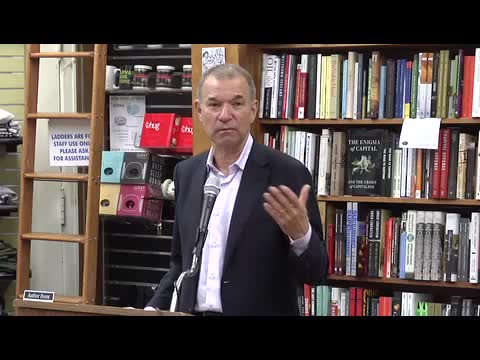Harvard Book Store; WGBH Forum Network; Stephen Greenblatt: Shakespeare's Freedom

- Transcript
In writing this book I became more and more struck by how intensely Shakespeare feels that the human project depends upon boundaries and upon the understanding of where the boundaries are that there are characters as I say in the chapter on autonomy in this book. And the idea of autonomy is liberty to live after one's own law which is what it how it was for us to find when it first was used as an English word in the 70 century autonomy as is the ability to live after one's own law that that's the slogan for Shakespeare's villains. Not for any one who is the. He ultimately thinks that human being should model themselves after it make their peace with the. Shakespeare. It's not so much as a political idea I mean I think actually Shakespeare associated it wasn't Shakespeare was it was proposing and used at his time a kind of conservative politics he was opposing he was proposing limits in relation to a
crazy claim of of them wasn't the reality in the inn on the ground but the crazy claim of the monarchs that he knew that St. Elizabeth and James to rule without limits they say was that it was an idea against the principal claims of his own authority figures who claimed that they themselves knew no limits and that for that matter they were only imitating the God himself who was precisely a creature who lived who was the very model of living without any limits at all. Shakespeare seems to me as a sensibility much closer to that that you would find. Let's say in the ancient philosopher Epicurus who thought that human pleasure human happiness precisely depended on knowing that boundaries. OK that's the general overarching view of the book and I'll just read you a couple of little pieces of it. Since Ryan mentioned my memorable encounter with it to be memorable and the case with Bill
Clinton I was going to start just by reading that it's the beginning of the fourth chapter in this book.
- Collection
- Harvard Book Store
- Series
- WGBH Forum Network
- Contributing Organization
- WGBH (Boston, Massachusetts)
- AAPB ID
- cpb-aacip/15-x921c1tx4g
If you have more information about this item than what is given here, or if you have concerns about this record, we want to know! Contact us, indicating the AAPB ID (cpb-aacip/15-x921c1tx4g).
- Description
- Description
- Shakespeare scholar Stephen Greenblatt discusses his new book, Shakespeare's Freedom.Shakespeare lived in a world of absolutes--of claims for the absolute authority of scripture, monarch, and God, and the authority of fathers over wives and children, the old over the young, and the gentle over the baseborn. Stephen Greenblatt, author of the best-selling Will in the World, shows that Shakespeare was strikingly averse to such absolutes and constantly probed the possibility of freedom from them. Again and again, Shakespeare confounds the designs and pretensions of kings, generals, and churchmen. His aversion to absolutes even leads him to probe the exalted and seemingly limitless passions of his lovers.Greenblatt explores this rich theme by addressing four of Shakespeare's preoccupations across all the genres in which he worked. He first considers the idea of beauty in Shakespeare's works, specifically his challenge to the cult of featureless perfection and his interest in distinguishing marks. He then turns to Shakespeare's interest in murderous hatred, most famously embodied in Shylock but seen also in the character Bernardine in Measure for Measure. Next Greenblatt considers the idea of Shakespearean authority--that is, Shakespeare's deep sense of the ethical ambiguity of power, including his own. Ultimately, Greenblatt takes up Shakespearean autonomy, in particular the freedom of artists, guided by distinctive forms of perception, to live by their own laws and to claim that their creations are singularly unconstrained.
- Date
- 2010-11-15
- Topics
- Literature
- History
- Subjects
- Art & Architecture; History
- Media type
- Moving Image
- Duration
- 00:02:18
- Credits
-
-
Distributor: WGBH
Speaker2: Greenblatt, Stephen
- AAPB Contributor Holdings
-
WGBH
Identifier: dc2baab2bdf65da711a334a30ad0e1a7fd04bdf6 (ArtesiaDAM UOI_ID)
Format: video/quicktime
Duration: 00:01:38
If you have a copy of this asset and would like us to add it to our catalog, please contact us.
- Citations
- Chicago: “Harvard Book Store; WGBH Forum Network; Stephen Greenblatt: Shakespeare's Freedom,” 2010-11-15, WGBH, American Archive of Public Broadcasting (GBH and the Library of Congress), Boston, MA and Washington, DC, accessed July 3, 2025, http://americanarchive.org/catalog/cpb-aacip-15-x921c1tx4g.
- MLA: “Harvard Book Store; WGBH Forum Network; Stephen Greenblatt: Shakespeare's Freedom.” 2010-11-15. WGBH, American Archive of Public Broadcasting (GBH and the Library of Congress), Boston, MA and Washington, DC. Web. July 3, 2025. <http://americanarchive.org/catalog/cpb-aacip-15-x921c1tx4g>.
- APA: Harvard Book Store; WGBH Forum Network; Stephen Greenblatt: Shakespeare's Freedom. Boston, MA: WGBH, American Archive of Public Broadcasting (GBH and the Library of Congress), Boston, MA and Washington, DC. Retrieved from http://americanarchive.org/catalog/cpb-aacip-15-x921c1tx4g